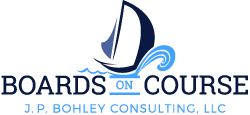Tip #37 Not to Engage in Foresight: An Ethical Failure?
Boards are responsible for and are accountable for the wellbeing and performance of the organizations that they govern. As our society and our communities evolve, as technologies develop, as needs and opportunities shift, it is the board’s responsibility to ensure that the governed organization will continue to be relevant, will continue to be able to make a valued contribution in the future. Ensuring a relevant future for one’s organization requires boards to engage in foresight.
According to John Carver, the creator of the Policy Governance® model, “Foresight is not just one of the characteristics of a board, it is almost the total engagement of the board.” (in Conversations on Servant-Leadership, SUNY Press, 2015, p. 58)
Foresight involves systematically analyzing the past and current trends and projecting possible futures to be effectively influenced or adjusted to. Without foresight, a board cannot anticipate opportunities and threats and envision an organizational purpose of continuing relevance.
Not to engage in foresight has been described as an ethical failure by Robert Greenleaf, the developer of the Servant Leadership concept. (The Servant as Leader, The Greenleaf Center, 2008, p. 27) The board that fails to be proactive while still able to provide organizational guidance into the future fails in its basic governance role.
A few tips for facilitating your board’s future-focused thinking follow:
- First of all, a board needs to have the time and energy to engage in foresight or future-focused thinking. Consider the following ideas for improving board meeting efficiency. Free up time on your board agenda by refraining from over-involvement in operational matters that have been delegated to management. Utilize a consent agenda to expedite board action on non-controversial items. Policy Governance uses a type of consent agenda which it calls a Required Approvals Agenda to group together agenda items regarding matters delegated to the chief executive but that an outside authority requires approval by the board. Provide board members with concise information packets prior to the board meeting with information organized into three categories: information for board decision-making, information for board monitoring of organizational performance, and incidental information, that is, information that may be good to know.
- Commit to ongoing in-depth board education about societal and community trends as well as issues and changing needs relevant to your specific organizational mission. Support board members’ participation in educational opportunities outside the boardroom. Bring in speakers to provide important information and different perspectives to enrich board thinking. Budget funds for educational opportunities for individual board members and for the board as a whole.
- Break away occasionally from your regular board meeting structure, process, and meeting environment to allow for extended future-focused discussion.
- Use group process tools to encourage and facilitate creative future-focused thinking. For example, visioning questions can be used to encourage such thinking: “Five years from now what will people recognize as being the most important accomplishment of our organization?” “What would we most like to see (or least like to see) as a headline about our organization in the newspaper a few years from now?” Other tools include environmental scanning, trend analysis, imagining possible and preferred futures, brainstorming, role play, mind mapping, etc. Consider engaging a group process consultant to facilitate creative board discussion and use of such tools.
In the Policy Governance® model, the board is there “to envision and create a future” for the organization it is governing. (Conversations on Servant-Leadership, p. 58). For more information about the Policy Governance® system, please go to https://www.BoardsOnCourse.com/policy-governance.
To read other Tips for Effective Boards, click https://www.BoardsOnCourse.com/blog.
